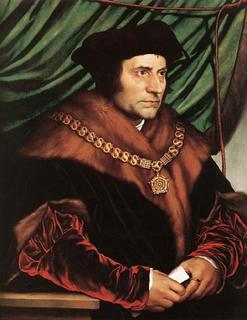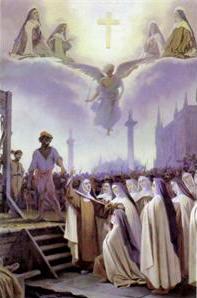
Martyr for the Faith
The years 1500 and onwards in England would be difficult and tumultuous ones as Henry Vlll ascended the Throne of England as King in 1509, and alongside Henry his wife Catherine of Aragon would become his Queen. But King Henry the Vlll was an immature 17 year old lad who was full of self importance and lacking in wisdom.
For Henry the Vlll was a man of volatile and tumultuous temperament who could also be vindictive as well as garrulous, a very combustible personality. One of his first acts as King was to abolish the heavy taxes which his father before him had imposed; his way of ending this tax was to execute the officials who helped impose it! To work for King Henry Vlll could be very perilous indeed, as many were to find out, including his friend, Thomas More.
Thomas More was born into a prosperous family in 1478, due to his wealth Thomas was to enjoy the benefits of a good education, provided by the wealth of his father Judge John More. His early education was at St. Anthony's school before moving onto the much respected university at Oxford. This provided Thomas an avenue to express his love of literature, it also helped Thomas to make long and enduring friendships, for Thomas personality was pleasing, polite and humorous.
The young Thomas did not take himself too seriously, which made him very popular amongst his contemporaries, and which would hold him in good stead in his future.
Though Thomas loved literature due to pressure from his father, he too decided to study the law and to earn his living in a field which needed much skill and enterprise. But Thomas maintained a curious mind in all things and was an avid reader and scholar.
But beneath the surface of Thomas amiable personality lay a very deep and abiding love of God and the Faith, which soon consumed him so much so that he gave up his practice and tried to enter a Monastery. He stayed with the Carthusians for a time and became a great admirer of monastic living and its spirit of discipline. But Thomas's personality was of a man for the people, he wished to serve his fellow man and with his witty but gentle persona, he decided to leave the Carthusians and enter politics.
Upon entering the political arena it did not take Thomas long before he fell foul of King Henry the Vll, who when Thomas opposed a bill which would grant the King more money, King Henry the Vll then imprisoned Sir John More in retribution!
Thomas decided upon the release of his father, to instead concentrate on his interest in literature and to wait out the Kings wrath, for one of the abiding gifts that Thomas had was a spirit of perseverance. Thomas also concentrated on his family and his lovely new wife whom he had married in 1505. This was a happy time for the family as they enjoyed the social season and took part in visiting plays and other social activities.
But in 1510 Thomas More was appointed as an under-sheriff in the city of London, it was during this time that Thomas was to meet many people who were not as fortunate as he, and Thomas tried his best to be fair to all he encountered. But London was not a very sanitary place to live and unfortunately Thomas More wife died whilst trying to give birth.
But Thomas did not like life alone so he remarried for a second time to his new wife, Alice. It was during this period that King Henry the Vlll, came to meet Thomas and due to Thomas humour and wit the King and Thomas were to become good friends. Thomas also helped King Henry Vlll to counter Luthers Reformation, when he wrote 'Defence of the Seven Sacraments', unbeknownst to both that the King too would soon turn against the Church in Rome!
Thomas More and King Henry Vlll complimented one another in that both were witty, intelligent with a love for the arts, they also shared a love of literature and many other activities. But the King lacked Thomas's more human and compassionate nature, for Thomas though witty was not a sardonic man, nor was he selfish. In many ways and in various area's it was Thomas who would outshine the King by his very deep and abiding love for his Faith and his genuine concern and love for the people.
What would start out as a friendship among equals soon turned to jealousy on the Kings part as he became aware that Thomas was the more genuine and sincere man of the people, for Thomas had done the unforgivable he had outclassed the King in intellect, humour and principles! But even though the Kings friendship with Thomas was to become tricky, still he appointed Thomas More as Lord Chancellor in 1529, this was indeed a great honour for the More family but it would come at a terrible price!
For the King was determined to bring forth a son so as to inherit the throne and unfortunately Katherine of Aragon had born him a daughter, Mary. The King was disgruntled that in their years of marriage no further children were added, this was to lead to resentment and petulance as the King blamed his wife, Katherine for her inability to produce a male heir.
It was this urgency to produce a male heir that drove King Henry Vlll to contemplate divorce, which was anathema to Thomas More a man of great integrity and principles. But Henry was a man of ruthless ambition, and he met his match in ruthlessness upon meeting one of his wife’s ladies in waiting, the very striking Anne Boleyn, the King fell madly in love and the course was set for further conflict.
Thomas More could not accept the Kings decision to try and divorce Queen Katherine, so he resigned his position as Lord Chancellor in 1532, for he strongly disapproved of the Kings attempts to divorce his wife of many years standing. Even when Anne Boleyn was crowned Queen in 1533 Thomas had refused to attend her coronation, this infuriated the tempestuous Anne and the volatile Henry, Thomas Mores days were now numbered!
In 1534 Thomas More also refused to swear allegiance to the King in the Act of Succession nor would he swear an oath to acknowledge King Henry's ascendency over Rome! This was too much for King Henry Vlll and in his fury he had Thomas arrested and thrown into the Tower of London.
But unlike the King Thomas More bore no malice in his heart, nor would he deny The Church of Rome's authority to save his life by swearing an allegiance to the King and thereby acknowledge the illegitimate Queen Anne Boleyn.
For Thomas More was a man of God first and also an obedient son of the Church in Rome, he therefore stood by his principles even unto death, for though Henry was King, it was Thomas who had the heart and courage of a Lion!
Whilst waiting on the scaffold his final words were, "The King's good servant, but God's First"!
Thomas More was beheaded in 1535.
Thomas More was canonized by Pope Pius Xl in 1935.
Peace of Christ to you ALL
Copyright © 2005 Marie Smith. All rights reserved.

